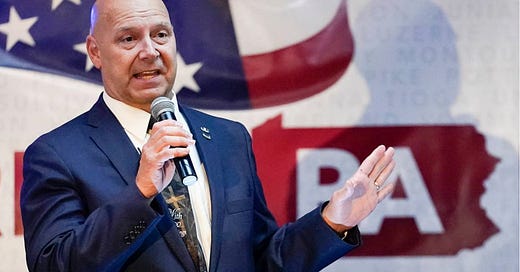Mastriano tears up campaign norms
The GOP nominee is Pennsylvania is ignoring traditional media. It could work.
Doug Mastriano, the controversial Republican nominee for governor in Pennsylvania, is tearing up the traditional playbook for running a statewide campaign.
And while some traditional political strategists are wary of his unconventional approach, others think it’s a template for future campaigns, especially for GOPers who increasingly believe they don’t get a fair shake from mainstream media and can mine other media channels for similar reach.
Read my full piece at McClatchyDC.
Highlights …
He isn’t courting his formal Republican rivals.
“I haven’t heard from Doug. Last we spoke was Election Night,” said Lou Barletta, the former congressman and second place finisher in the May 17 primary who is supporting Mastriano but hasn’t been asked to campaign for him.
“I told him point-blank, I said, ‘I’ll do whatever you want to help you, but you’ve got to tell me what it is.’ And I haven’t heard anything since. Nothing,” Charlie Gerow said. “He’s kind of a lone wolf in many respects… It is a very, very unusual situation.”
He’s using Facebook Live to communicate rather than traditional media.
Last week, on such a livestream, Mastriano — who has continued to deny that President Joe Biden rightfully won Pennsylvania in 2020 — said he would need 4,000 poll watchers to monitor the November election. He acknowledged Mehmet Oz as the Republican nominee for U.S. Senate. “You might disagree with some of his past statements, current statements, he’s the people’s choice,” Mastriano said.
Republicans note that shunning traditional press worked for Glenn Youngkin in Virginia.
“The framing of most political journalism is ‘We need to get the contrast, the yes-or-no type questions,’ frequently bringing up topics that aren’t what the candidate is dealing with from voters,” Eric Wilson said. “There’s some frustration there. If this is all about trying to make me look bad, then why would I participate?”
“If (candidates) can get the same reach and have control over the message and reduce (their) exposure, that’s a sound strategy,” Wilson said.
Full piece HERE.




